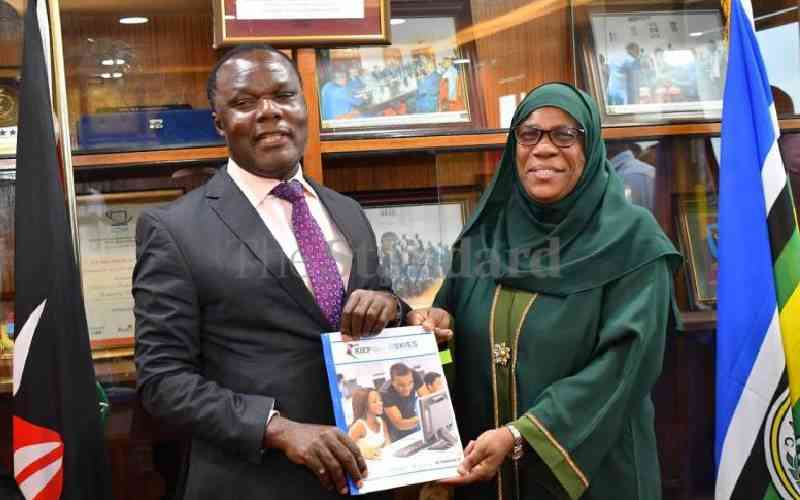While the National Cohesion and Integration Commission Chairman Francis Ole Kaparo is calling for a forum to discuss way forward over ethnicity in universities and other institutions of higher learning, University leadership has continuously promoted the vice in the name of promoting “local” beneficiaries.
However, in as much as the move could be noble, it is still unfortunate that the process has promoted tribalism and nepotism where the geographical position has led to a new political wave, a situation where politicians are in the process of bringing in “a sense of belonging.”
The political tussle where the dust is yet to settle is in Bomet County where the Governor wants a university to be built next to his backyard instead of at the County Headquarters. Moi University branch, Mogotio, was also in the middle of a scuffle as area leaders argued on where it was to be built. Prof. Hellen Sambili and Lembus Council of Elders had to come to an agreement recently.
Sadly, the newly born University of Eldoret in the recent times had its doors closed when Uasin-Gishu Senator accused the Vice-Chancellor and her new administration of tribalism and organized a protest against the University leadership.
“Universities are not for particular communities or clans.” Francis Ole Kaparo said while addressing the media in Eldoret last week.
This is where we ask, are universities still portrayed as the image of literacy and research policies or are they just institutions linked to the needs of communities?
The writings are unfortunately written on the wall! There is a big indication that other than tribalism, nepotism has ruled our higher institutions of learning in total disregard to being public national institutions contrary to what is stipulated in the constitution.
Education can only be useful and relevant if taught and implemented in these institutions as well. We must teach students about respect, tolerance, patriotism and nationalism. This message is elaborated further by UNESCO’s education policy where global citizenry is key.
In fact, other than teaching our young people about internationally accepted trainings like gender-sensitive strategies, we should also reflect our cultural and moral ethnics with targets and goals that are vital to fully grown-up beings: physically, mentally and spiritually.
Credit must go to retired President Daniel Arap Moi’s 8-4-4 education reform system where he employed Love, Peace and Unity philosophy. His critics may not agree with me but that was the way to go then! It was vital and progress was attained. How else could we measure progress in education when it helped all Kenyans understand what worked and what didn’t?
In its report, NCIC under Dr. Kibunjia in 2012 openly told parliament that tribalism and nepotism was ripe in Universities. That the largest communities: Kikuyu, Luhya, Kalenjin, Luo and Kamba who form 66% of the country’s populace are in major political appointments. These practices have degraded today’s society and in the process marginalized others. The NCIC report also stated that most vice-chancellors and principals of Constituent Colleges employ staff from their ethnic community.
These appointments can never attract or embrace cultural diversity and nationalism. So many conflicting interests on ethnic divisions by political class has remained relevant on behalf of the masses. Other than the big five, where will the 42 tribes go to?
On the contrary, ethnic diversity can be used as a great tool in as far as national unity is concerned. This is where the admitted students freely intermingle and form future enrollment from youthful citizenry into nationhood and potential adulthood. This trend can help our beloved Kenya!
Sadly, and indeed unforgivable for Kenyans in this 21st century to be reflected in such level of ethnicity. We are living in an era where education for all - meaning exactly that we will and are part of global society where leaders and governments have the role to provide education that must be achievable.
Moreover, the year 2015 marks the transition from the Millennium Development Goals (MDG) to a new set of global targets like Sustainable Development Goals (SDG) including education which reflects current trends and developmental challenges in technology and innovation.
Stay informed. Subscribe to our newsletter
The Jubilee administration is lucky to be the “digital” government and should address society’s democracies and inform other global processes; otherwise Kenya will not attain meaningful development agenda until it is inclusive and cohesive enough to embrace all members of society without any kind of discrimination whatsoever!
Kurgat Martin Seronei, Is a lecturer at the School of Information Sciences, Moi University – Eldoret.
 The Standard Group Plc is a
multi-media organization with investments in media platforms spanning newspaper
print operations, television, radio broadcasting, digital and online services. The
Standard Group is recognized as a leading multi-media house in Kenya with a key
influence in matters of national and international interest.
The Standard Group Plc is a
multi-media organization with investments in media platforms spanning newspaper
print operations, television, radio broadcasting, digital and online services. The
Standard Group is recognized as a leading multi-media house in Kenya with a key
influence in matters of national and international interest.
 The Standard Group Plc is a
multi-media organization with investments in media platforms spanning newspaper
print operations, television, radio broadcasting, digital and online services. The
Standard Group is recognized as a leading multi-media house in Kenya with a key
influence in matters of national and international interest.
The Standard Group Plc is a
multi-media organization with investments in media platforms spanning newspaper
print operations, television, radio broadcasting, digital and online services. The
Standard Group is recognized as a leading multi-media house in Kenya with a key
influence in matters of national and international interest.









